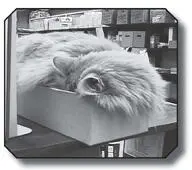“Look at him. He’s so thin. You guys have to be feed him more.”
“We’re taking good care of him.”
“But he’s so thin. Can’t you give him something for me?”
I could, except Dewey did the same thing yesterday. And the day before that. And the day before that. In fact, you’re the fifth person he’s hit with the starving-cat routine today.
Now, how was I going to tell a patron that? I always gave in, which of course just encouraged more bad behavior. I think Dewey enjoyed the taste of food more when he knew I didn’t want to give it to him. Let’s call it the taste of victory.
Chapter 25
The Meeting

As Dewey entered old age, the kindness of Spencer Public Library patrons really began to show. Friends and visitors alike were gentler around him. They talked to him more and were attentive to his needs, much as you would be to an older relative at a family reunion. Occasionally someone would comment that he looked weak, or thin, or dirty, but I knew their concern was a manifestation of their love.
“What’s wrong with his fur?” was probably the most common question.
“Nothing,” I told them. “He’s just old.”
It’s true, Dewey’s fur had lost much of its luster. It was no longer radiant orange, but a dull copper. It was also increasingly matted, so much so I couldn’t keep up with a simple brushing. I took Dewey to Dr. Franck, who explained that as cats aged, the barbs on their tongues wore down. Even if they licked themselves regularly, they couldn’t do an efficient job grooming because there was nothing to separate the fur. Tangles and mats were just another symptom of old age.
“As for these,” Dr. Franck said, studying Dewey’s clumped back end, “drastic measures are required. I think we better shave.”
When she was done, poor Dewey was fuzzy on one end, bare on the other. He looked like he was wearing a big mink coat and no pants. A few members of the staff laughed when they saw him, because it was a hilarious sight, but they didn’t laugh long. The humiliation on Dewey’s face stopped that. He hated it. Just hated it. He walked away very fast for a few steps, then sat down and tried to hide his rear end. Then he got up, walked quickly away, and sat down again. Start, stop. Start, stop. He finally made it back to his bed, buried his head in his paws, and curled up beneath his favorite toy, Marty Mouse. For days, we found him with his top half sticking out into an aisle and his back end hidden in a bookshelf.
But Dewey’s health was no laughing matter. The staff didn’t talk about it, but I knew they were worried. They were afraid they would come in one morning and find Dewey dead on the floor. It wasn’t his death that worried some of them, I realized, but the thought of having to deal with it themselves. Or even worse, having to make a decision in a health crisis. Between my own health issues and my trips to Des Moines on state library business, I was frequently out of the library. Dewey was my cat, and everyone knew it. The last thing they wanted was to have the life of my cat in their hands.
“Don’t worry,” I told them. “Just do what you think is best for Dewey. You can’t do anything wrong.”
I couldn’t promise the staff nothing would happen while I was away, but I told them, “I know this cat. I know when he is healthy, a little sick, and really sick. If he’s really sick, trust me, he’s going to the vet. I’ll do whatever it takes.”
Besides, Dewey wasn’t sick. He still jumped up and down from the circulation desk, so I knew his arthritis wasn’t too bad. His digestion was better than ever. And he still loved the company of patrons. But it took patience to care for an elderly cat, and frankly, some of the staff didn’t think that was their job. Slowly, as Dewey aged, his support peeled away: first those in town with different agendas; then some of the fence-sitters; then a few patrons who wanted only an attractive, active cat; and finally the staff members who didn’t want the burden of geriatric care.
That doesn’t mean I wasn’t blindsided by the October 2006 library board meeting. I was expecting a typical discussion of the state of the library, but the meeting soon turned into a referendum on Dewey. A patron had mentioned he wasn’t looking well. Perhaps, the board suggested, we should get him some medical help?
“At his recent checkup,” I told them, “Dr. Franck discovered hyperthyroidism. It’s just another symptom of age, like his arthritis, his dry skin, and the black age spots on his lips and gums. Dr. Franck prescribed a medication that, thank goodness, doesn’t have to be taken orally. I rub it in his ear. Dewey has really perked up. And don’t worry,” I reminded them, “we’re paying for the medicine with donations and my own money. Not a single penny of city money is ever spent on Dewey’s care.”
“Is hyperthyroidism serious?”
“Yes, but it’s treatable.”
“Will this medicine help his fur?”
“Dullness isn’t a disease, it’s a function of age, like gray hair on a human.” They should understand. There wasn’t a head in the room without a few gray hairs.
“What about his weight?”
I explained his diet in detail, from the obsessiveness with which Donna and I changed his cat food to the Arby’s Beef ’n Cheddar sandwiches.
“But he doesn’t look good.”
They kept coming back to that. Dewey didn’t look good. Dewey was hurting the image of the library. I knew they meant well, that they were interested in finding the best solution for everyone, but I couldn’t understand their thinking. It was true, Dewey didn’t look as appealing. Everybody ages. Eighty-year-olds don’t look like twenty-year-olds, and they shouldn’t. We live in a throwaway culture that stashes older people away and tries not to look at them. They have wrinkles. They have age spots. They don’t walk well and their hands shake. Their eyes are watery, or they drool when they eat, or they “burp in their pants” too much (Jodi’s phrase from when she was two years old). We don’t want to see that. Even the accomplished elderly, even the people who gave their whole lives, we want them out of sight and out of mind. But maybe older people, and old cats, have something to teach us, if not about the world, then about ourselves.
“Why don’t you take Dewey home to live with you? I know he visits you on holidays.”
I had thought of that but dismissed it long ago. Dewey could never be happy living at my house. I was gone too much, between work and meetings. He hated to be alone. He was a public cat. He needed people around him, he needed the library around him, to be happy.
“We’ve had complaints, Vicki, don’t you understand? Our job is to speak for the citizens of this town.”
The board seemed ready to say the town didn’t want Dewey anymore. I knew that was ridiculous because I saw the community’s love for Dewey every day. I had no doubt the board had received a few complaints, but there had always been complaints. Now, with Dewey not looking his best, the voices were louder. But that didn’t mean the town had turned on Dewey. One thing I’d learned over the years was that the people who loved Dewey, who really wanted and needed him, weren’t the ones with the loudest voices. They were often the ones with no voices at all.
If this had been the board twenty years ago, I realized, we would never have been able to adopt Dewey. “Thank God,” I thought to myself. “Thank you, God, for past boards.”
And even if what the board thought was true, even if the majority of the town had turned its back on Dewey, didn’t we nonetheless have the duty to stand by him? Even if five people cared, wasn’t that enough? Even if nobody cared, the fact remained that Dewey loved the town of Spencer. He would always love Spencer. He needed us. We couldn’t just toss him out because looking at him, older and weaker, no longer made us proud.
Читать дальше













